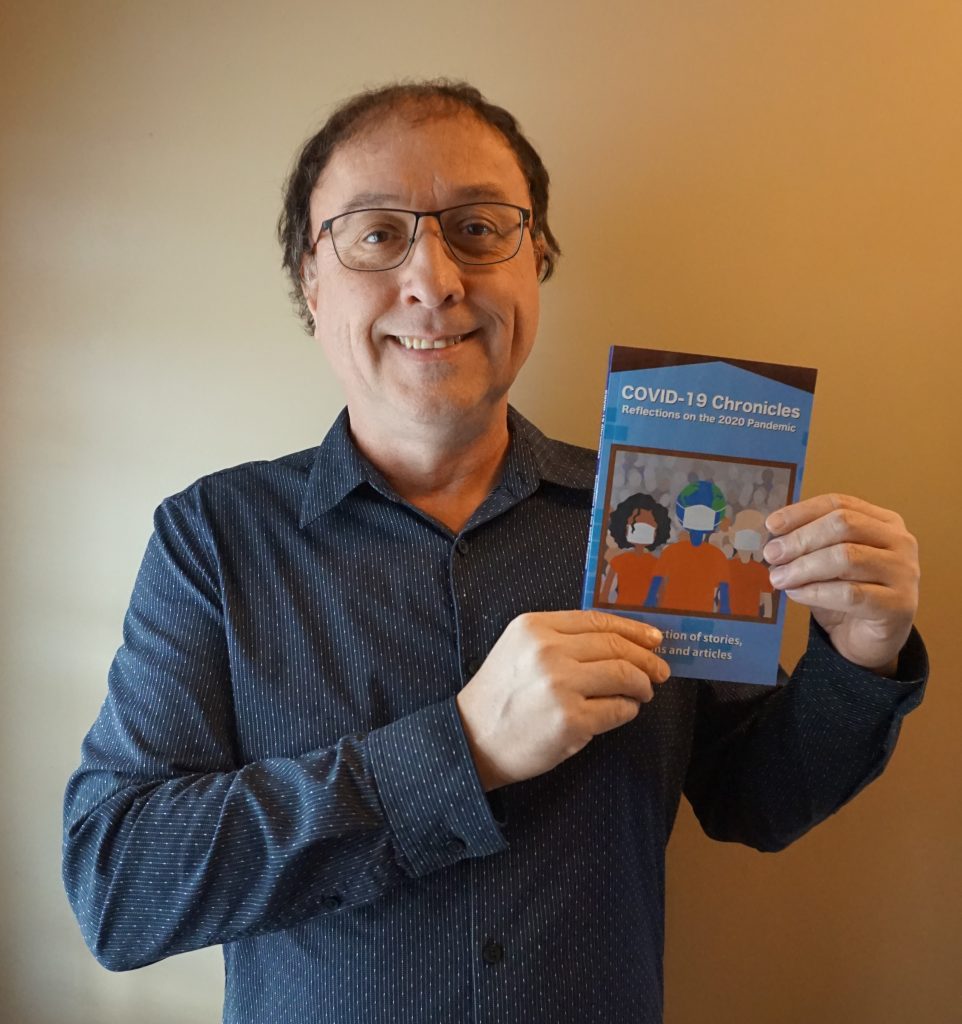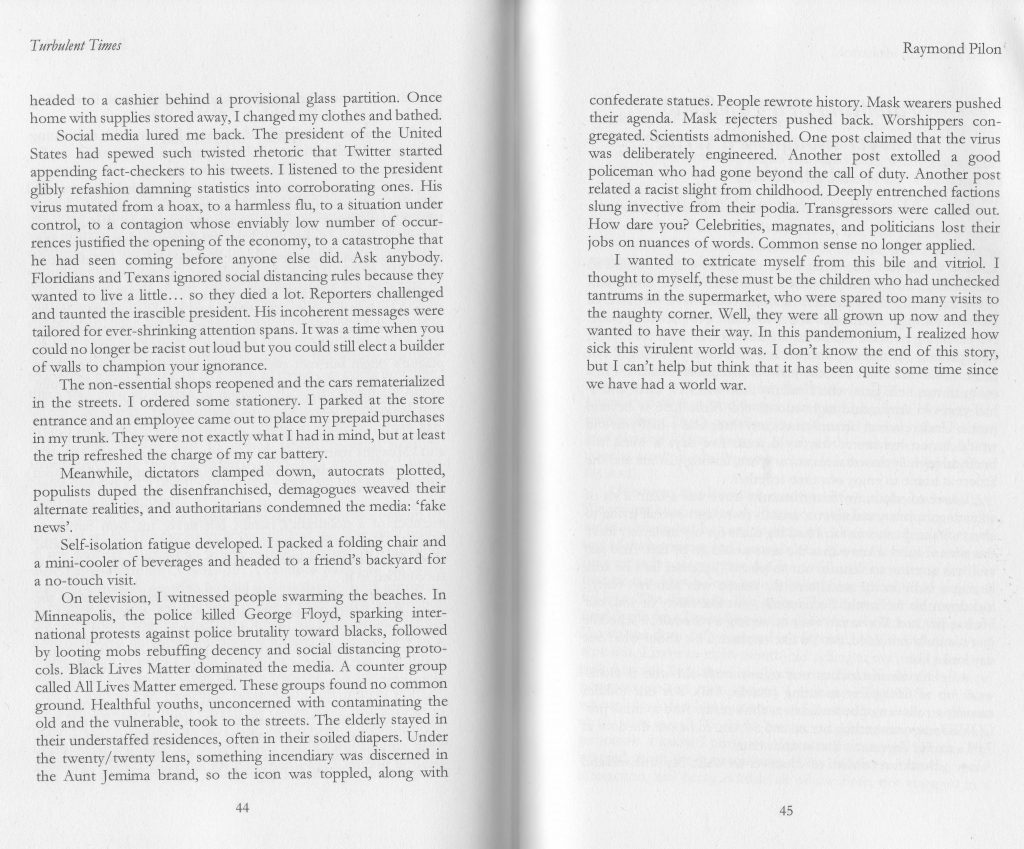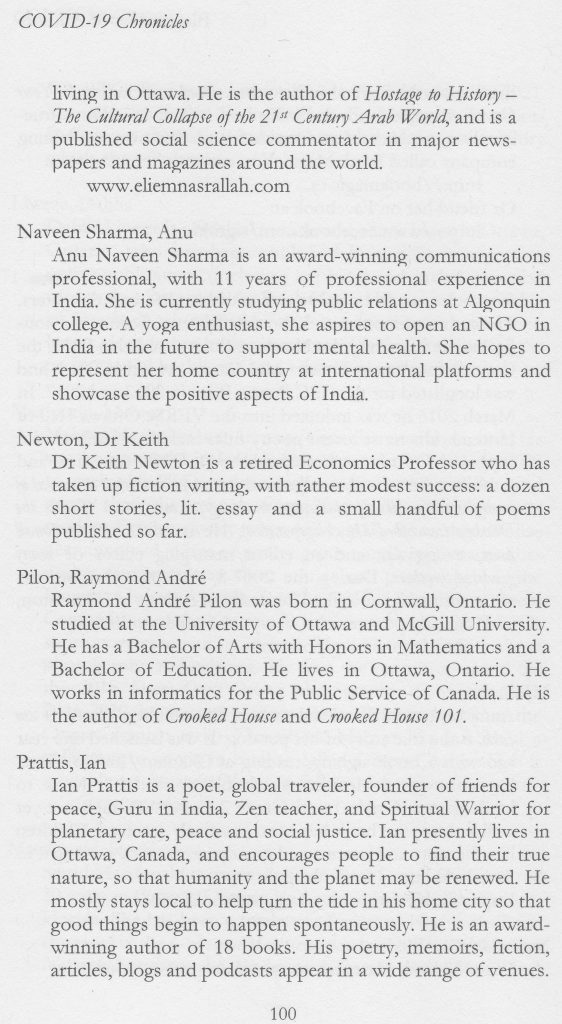The world had almost forgotten about pandemics, since the last real one a century ago, and so this generally unanticipated coronavirus ushered in a myriad of uncertainties. Will we turn into surreal zombies? Can the world just stop? Then the shops synchronously and unanimously closed. Overnight, traffic evaporated from the streets as the water of the vernal shower under the sunshine. I started to work from home. I was relieved that the grocery stores stayed open, but I did not imagine their shelves could stay stocked for very long―but they did. In the first weeks, toilet paper and disinfectant flew off the shelves reducing the speculating hoarders to myopic futurologists. In fact, with all those cars going nowhere, there was even an excess of gasoline. Countries vied for ventilators and masks. The graphical curb flattened as planned and even hospital beds were available, except in some countries like Italy where doctors had to decide which patients received treatment. These were unscripted times and when the United States elected a bigoted president, I gave up making even the most basic assumptions.
Telework and social media saved the day, but the tedium of isolation set in. The outdoors beckoned and the long, early walks in my thus far unexplored neighborhood started. My thoughts were hyper-aware of COVID-19. A cautious passer-by accosted me with a friendly greeting but did not escalate to a full sentence. A woman walking her dog beamed me a smile. I felt happy, but the real winner was the dog, upon which his stay-at-home family now bestowed unlimited attention. I looked in the window of a house where a poster hung displaying “Thank you front line workers” in variegated letters under a rainbow. An accordion bus sped by with its lone passenger, omitting the intermittent stops of the past. Melodious birds coaxed me out to more promenades in perfect safety. Could this be a lark, or perhaps a nightingale? I breathed in the pure air. It appeared that all the animals were rejoicing. Then, I hastened my pace homeward, cutting through the schoolyard and the empty park; the sky filled with foreboding clouds.
The grassroots collages of musical videos and the motivating messages of well-wishing celebrities tapered off in social media, yielding to narratives of distrust, blame and rage.
The Chinese government imprisoned the whistleblowers who sounded the alarm on the virus. Better to save face than to save lives. Chinese bots pumped out tweets to relocate the source of the virus from a pangolin in the Wuhan wet market to a US military base with biosafety lapses. Twitter deleted an infestation of nefarious accounts spreading falsehoods from this offending country which, ironically, blocked this type of media back home. China in cahoots with the World Health Organization sidestepped assisting Taiwan which, in turn, handled the contagion spectacularly. Australia requested a scientific investigation as to the plague’s origin, but met swift and severe retaliation. Not a peep was heard from other countries; no one dared offend the big bully.
The disinformation emanating from Russian bots created and exploited division, instability and chaos. “Cigarette smokers are more likely to survive the virus,” “Christians are homophobic,” and “Muslims reacted happily to a terrorist attack,” they claimed. The Russian president looked strong after he poisoned western alliances and discussions.
Some news trickled in about the virus infecting an actor or a member of a politician’s family, but never my own family or friends. The celebrities survived, but the tally of horrific deaths rose. Occasionally, someone who had downplayed the virus succumbed to it.
I drove to the supermarket and queued up outside the entrance. I shuffled forward, pausing behind the lines taped on the ground. Once inside, I grabbed a freshly disinfected cart and shopped. I considered a package of haddock but was not convinced. I followed the new arrows laid out on the floor: the traditional two-way aisles had been converted to one-way corridors for customers. I looked at a package of cod and retracted my decision; I backtracked, against the arrows, around a lady. I picked up the package of haddock. The lady prolonged her gaze on the label of her package in order not to acknowledge my transgression. Grateful, I placed the haddock in my cart and headed to a cashier behind a provisional glass partition. Once home with supplies stored away, I changed my clothes and bathed.
Social media lured me back. The president of the United States had spewed such twisted rhetoric that Twitter started appending fact-checkers to his tweets. I listened to the president glibly refashion damning statistics into corroborating ones. His virus mutated from a hoax, to a harmless flu, to a situation under control, to a contagion whose enviably low number of occurrences justified the opening of the economy, to a catastrophe that he had seen coming before anyone else did―ask anybody. Floridians and Texans ignored social distancing rules because they wanted to live a little―so they died a lot. Reporters challenged and taunted the irascible president. His incoherent messages were tailored for ever-shrinking attention spans. It was a time when you could no longer be racist out loud but you could still elect a builder of walls to champion your ignorance.
The non-essential shops reopened and the cars rematerialized in the streets. I ordered some stationery. I parked at the store entrance and an employee came out to place my prepaid purchases in my trunk. They were not exactly what I had in mind, but at least the trip refreshed the charge of my car battery.
Meanwhile, dictators clamped down, autocrats plotted, populists duped the disenfranchised, demagogues weaved their alternate realities, and authoritarians condemned the media―“fake news.”
Self-isolation fatigue developed. I packed a folding chair and a mini-cooler of beverages and headed to a friend’s backyard for a no-touch visit.
On television, I witnessed people swarming the beaches. In Minneapolis, the police killed George Floyd, sparking international protests against police brutality toward blacks, followed by looting mobs rebuffing decency and social distancing protocols. Black Lives Matter dominated the media. A counter group called All Lives Matter emerged. These groups found no common ground. Healthful youths, unconcerned with contaminating the old and the vulnerable, took to the streets. The elderly stayed in their understaffed residences, often in their soiled diapers. Under the twenty-twenty lens, something incendiary was discerned in the Aunt Jemima brand, so the icon was toppled, along with confederate statues. People rewrote history. Mask wearers pushed their agenda. Mask rejecters pushed back. Worshippers congregated. Scientists admonished. One post claimed that the virus was deliberately engineered. Another post extolled a good policeman who had gone beyond the call of duty. Another post related a racist slight from childhood. Deeply entrenched factions slung invective from their podia. Transgressors were called out. How dare you? Celebrities, magnates and politicians lost their jobs on nuances of words. Common sense no longer applied.
I wanted to extricate myself from this bile and vitriol. I thought to myself, these must be the children who had unchecked tantrums in the supermarket, who were spared too many visits to the naughty corner. Well, they were all grown up now and they wanted to have their way. In this pandemonium, I realized how sick this virulent world was. I don’t know the end of this story, but I can’t help but think that it has been quite some time since we have had a world war.
Written by Raymond Pilon, July 2020

Turbulent Times was published in COVID-19 Chronicles in November 2020. The book is the winner in the print category of the 43rd CEMA Awards (2021).


